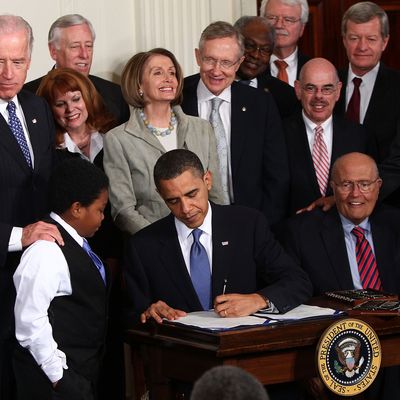
David Brooks has a new reason to be disappointed in Obamacare. The problem is not so much that the new law has done bad things — he concedes that it has insured 20 million people — but that it was sold on a false basis. It is mostly helping poor people obtain insurance, he observes sadly, rather than overturning the entire system. “[T]his is not bad. But we’d have had a very different debate if we knew the law was going to be a discrete government effort to subsidize health care for more poor people,” writes Brooks in his column today. “For one thing, Democrats would have probably paid a much smaller political price if their effort wasn’t billed as an extravagant government grab to take over the nation’s health care system.” This is a great point. Why, exactly, did the Democrats decide to advertise their plan as an extravagant government grab to take over the nation’s health-care system? That turns out to have been a really poor choice!
Oh, wait a second. They didn’t. A close inspection of the public record actually reveals that it was the Republicans who described Obamacare as an extravagant government takeover. The Democratic message was just the opposite. President Obama proposed a plan that would create subsidized insurance for those who were too poor or too sick to buy it on their own while also introducing a wide range of reforms designed to bend the curve of long-term cost growth. He repeatedly and explicitly made the case that his plan would leave the existing system in place for people who already had employer-sponsored insurance. A complete overhaul, he argued, “would represent a radical shift that would disrupt the health care most people currently have. Since health care represents one-sixth of our economy, I believe it makes more sense to build on what works and fix what doesn’t, rather than try to build an entirely new system from scratch.” He also insisted over and over that his plan was “not a big government takeover.”
And he was right. Obamacare created affordable insurance for the uninsured who were too poor or sick to get it on their own. (The exception being poor people who live in Republican-controlled states that, through a loophole created by the activist Roberts Court, have enjoyed the opportunity to deny Medicaid to their most vulnerable citizens.) And it has implemented a wide range of cost reforms. The result is a coverage expansion that has come in well below its expected costs — indeed, the federal government is spending less on health care now than it was projected to spend before Obamacare passed.
The downside is that the new subsidized insurance turns out to be very stingy. Initial premiums came in far less expensive than initially forecast, and now a price correction is bringing them back closer to, but still below, the initial forecasts. Most consumers will have three or more plans to choose from, but insurers have exited the system, and the overall choices have shrunk. Still, what remains is a reform that has given millions of Americans life-changing access to medical care while coming in well below its projected cost and squeezing the most inefficient incentives out of a system that was built to encourage waste. (Jonathan Cohn has a balanced summary of the program’s current state of play.) You can make a case against Obamacare in comparison to a hypothesized alternative, but not in comparison to the old system, which had much higher cost growth and also much more suffering from lack of access.
If you listened to David Brooks during the health-care debate, this is not what you would have expected to happen. Brooks insisted over and over and over that Obamacare was spending too much on subsidies and doing too little to control costs. Democrats’ “passion for coverage has swamped their less visceral commitment to reducing debt. The result is a bill that is fundamentally imbalanced,” he wrote in 2010. The Democrats “stuffed the legislation with gimmicks and dodges designed to get a good score from the Congressional Budget Office but don’t genuinely control runaway spending.” (In reality, the “gimmicks” Brooks described were literal figments of the Republican imagination.)
Brooks always took pains to make it clear that he was not one of those Republicans who opposed universal insurance on principle. It was just the costs that concerned him. “Health care reform is important,” he wrote, “but it is not worth bankrupting the country over.” Today, Brooks complains that the program is not too lavish but too stingy: “The subsidies are too small. The premiums are too costly. The deductibles are too high,” he writes. It’s almost as if Brooks decided to oppose health-care reform and then filled in the specifics of his argument later.






























